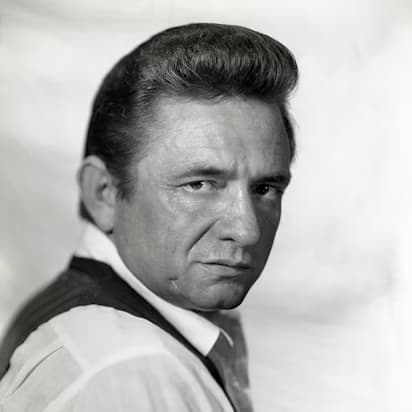
The Moral Echo of the Plains: The Man in Black’s Cautionary Cowboy Tale
There are certain songs, woven from the fabric of American myth and dusty trail lore, that don’t merely entertain, but endure as haunting moral parables. Among them, “(Ghost) Riders in the Sky: A Cowboy Legend” stands tall, and no artist embodied its somber majesty quite like Johnny Cash. His rendition, appearing on his 1979 album Silver, wasn’t the first, nor was it the biggest commercial hit of his storied career, but it was arguably the most authoritative.
Cash’s version charted on the Billboard Hot Country Singles & Tracks chart on April 15, 1979, and rode the range for 16 weeks, eventually peaking at an impressive No. 2 spot in July of that year. While it’s crucial to note that the original song was written by Stan Jones in 1948 and became a massive pop hit for Vaughn Monroe (hitting No. 1 in 1949), Cash’s late-career take felt like the natural, inevitable final word—the judgment handed down by the Man in Black himself.
The Genesis of the Legend and the Voice of Redemption
The story behind “(Ghost) Riders in the Sky” is as vast and mythic as the American West it evokes. Songwriter Stan Jones drew inspiration from an old Native American or “old cowboy” story he heard as a young boy in Arizona, recounting a sighting during a massive thunderstorm. The tale, deeply resonant with the European myth of the “Wild Hunt,” speaks of a cowboy who, while resting on a ridge one “dark and windy day,” witnesses a terrifying vision. Across the cloudy draw, he sees a “mighty herd of red-eyed cows” with “hooves were made of steel” being ceaselessly pursued by the spectral figures of damned cowboys.
The meaning of the song is a stark, uncomplicated morality play: a direct warning whispered from the spectral riders themselves. One rider calls out to the living cowboy, imploring him to heed the sight: “If you wanna save your soul from Hell a-ridin’ on our range, / Then cowboy, change your ways today, or with us you will ride, / Tryin’ to catch the Devil’s herd across these endless skies.” It’s a powerful message of repentance and the eternal consequence of a sinful life, themes that echoed the core struggles and eventual redemption so central to Johnny Cash’s own persona and repertoire. The song’s melody, in a twist of Americana history, is famously based on the Civil War-era tune, “When Johnny Comes Marching Home.”
Cash’s Canyon-Deep Interpretation
For older listeners, those who’ve lived through decades of trials, Cash’s voice on this track brings an undeniable resonance. His baritone, already worn smooth by life, pain, and faith by 1979, didn’t just sing the warning; it became the warning. His performance is stripped of the orchestral pomp of the earlier pop versions. It’s stark, dry, and delivered with the weight of a preacher who knows sin intimately.
When Cash growls lines like “Their faces gaunt, their eyes were blurred, their shirts all soaked with sweat,” you’re not just hearing a folk tale; you’re hearing the echo of every bad choice, every road not taken, laid bare under a vast and unforgiving sky. His presence, the original outlaw of country music, gave the cautionary tale a profound, almost autobiographical authority. It was a man who had faced his own demons and ridden hard on the ragged edge, delivering a message of grace conditional on genuine change. It evokes a simpler time when right and wrong were etched into the landscape, and a chilling, minor-key ballad could serve as a powerful communal mirror, reflecting the need for a spiritual reckoning. This isn’t just a cowboy song; it’s a reckoning, forever bound up with the mystique of the Man in Black.